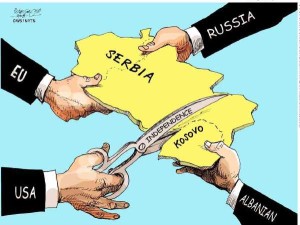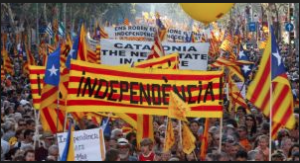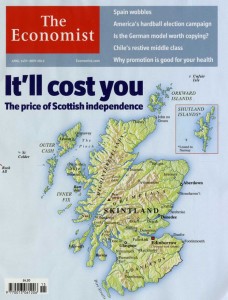Britain went to war to reinforce its sovereignty over the Falkland Islands. Therefore, it smacks of rank hypocrisy for Britain to be leading the chorus of European countries denouncing Serbia for merely threatening to go to war to reinforce its sovereignty over Kosovo…
Kosovo embodies as much historical, cultural, and religious significance for Serbs as Mecca holds for Saudis. Moreover, it happens to be situated right within Serbia’s universally recognized borders; not thousands of (imperial) miles away – as the Falklands are from Britain.
(“Kosovo: Wither Serbia’s Alamo,” The iPINIONS Journal, April 4, 2007)
 This, in part, is how I criticized the double standard Western powers used to facilitate Kosovo’s independence from Serbia. I was convinced that they were setting a precedent that would come home to roost. Sure enough, Russia wasted little time invoking the Kosovo precedent to facilitate South Ossetia and Abkazia’s independence from Georgia in 2008.
This, in part, is how I criticized the double standard Western powers used to facilitate Kosovo’s independence from Serbia. I was convinced that they were setting a precedent that would come home to roost. Sure enough, Russia wasted little time invoking the Kosovo precedent to facilitate South Ossetia and Abkazia’s independence from Georgia in 2008.
But, like Crimea, these were really just predominantly Russian provinces within nations voting to be reunited with their motherland. Catalonia, however, is a different matter.
Not only is Catalonia presenting an equally compelling case for independence as Kosovo; it is doing so in a non-violent way that stands in commendable and instructive contrast to the violence that attended Kosovo independence.
Alas, such is the vested (European) interest in holding Spain together (economically and politically) that, even if Catalonia were to vote ‘Yes,’ Western powers would surely conspire to nullify it; hence the double standard…
Nevertheless, semi-autonomous regions in other countries – like Italy’s German-speaking South Tyrol region, or Belgium’s Flemish and Walloon regions – are bound to tempt fate (for political, cultural and/or economic reasons) by following the pandora’s-box precedent Kosovo set.
(“Catalonia: Spain’s Kosovo Problem,” The iPINIONS Journal, October 1, 2012)
 The verdict is still out on Catalonia because its referendum is not scheduled until November 9, 2014. But talk about a pandora’s box:
The verdict is still out on Catalonia because its referendum is not scheduled until November 9, 2014. But talk about a pandora’s box:
‘Scotland, the Basque Country, Wales and Flanders are distinct nations with a long history behind and a strong will to govern themselves,’ Xavier Solano, former representative of the Catalan Government in the U.K., told CNBC.
Perhaps not all of them will bid for independence, however it seems reasonable to believe that some of them may think that their future would be better in their own hands. I am convinced that EU internal borders will be re-shaped by the democratic will of the people.’
(CNBC, March 21, 2014)
Wither Crimea in Ukraine; now Catalonia in Spain?
But never mind Catalonia; after all, while the international media had their sights focused on Crimea’s vote to breakaway from Ukraine, Venice was voting to breakaway from Italy.
Here’s how Gianluca Busato, a leader of the referendum movement, expressed the prevailing frustration and resentment that led to the vote in Venice:
Since Veneto was annexed to Italy in the 19th century we have never felt fully Italian, as we have our own culture and traditions.
But the main reason behind our need for independence is socio-economic: each year we pay Italy almost $100 billion in taxes, but $30 billion of it never makes it back in the form of services to the region. The government squanders our money! We are better off taking care of ourselves.
(NBC News, March 19, 2014)
Except that, just as no Western country has recognized Russia’s attempts to redraw the map of Europe (by exercising dominion over South Ossetia and Abkhazia and annexing Crimea), none will recognize attempts by these “distinct nations” within European countries to do so. Not to mention that the breakaway vote in Venice, as well as the one pending in Catalonia, is expressly non-binding on Italy.
 The vote in Scotland, however, will be binding on England. Not least because it seems Scotland has been negotiating the terms for an independence referendum with successive English governments ever since the Acts of Union created the United Kingdom of Great Britain in 1707. Milestones towards this end over these years included the creation of a Scottish Parliament in 1999 – complete with devolution of ministerial powers.
The vote in Scotland, however, will be binding on England. Not least because it seems Scotland has been negotiating the terms for an independence referendum with successive English governments ever since the Acts of Union created the United Kingdom of Great Britain in 1707. Milestones towards this end over these years included the creation of a Scottish Parliament in 1999 – complete with devolution of ministerial powers.
All the same, both latter-day English imperialists and their abiding Scottish loyalist are painting such a Dickensian future for an independent Scotland that the ‘Yes’ vote seems unlikely to carry the day when the referendum is held on September 18, 2014. And no less a person than Alex Salmond, first minister and leader of the Scottish National Party, is on record acknowledging that a ‘No’ vote could spell the end of the SNP as a political force and extinguish any aspiration for independence for at least a generation or two.
Finally, apropos of the double standard that had the United States supporting independence for majority Albanians in Kosovo but opposing it for majority Russians in Crimea, consider this prospect for California:
A report published in January by the state of California projects that Hispanics will become the state’s largest demographic group early next year and will represent nearly half of all residents by 2060.
(New York Times, February 20, 2014)
Which of course would mean not only that Hispanics could declare California a distinct nation within the United States, but also that, as such, it would rank among the largest nations in the world – with an estimated population in excess of 50 million.
But does anyone think the United States would ever even countenance allowing Hispanics to declare California an independent state, free to annex with Mexico the way Crimea annexed with Russia?
In the meantime, it’ll be interesting to see how Russia’s long-suffering republics react to the Kremlin treating Crimea like the proverbial prodigal son by turning it into the Monaco of the Black Sea. Especially given that Sochi, its Gstaad of the Caucasus, is already a veritable ghost city with crumbling buildings that look like they were abandoned decades ago. What price national pride … czarist vanity?
NOTE: The Palestinian Territories clearly constitute a “distinct nation” under the dominion, even if not within the state, of Israel. But the long-standing hypocrisy inherent in Western powers refusing to facilitate Palestine’s independence from Israel, the way they facilitated Kosovo’s from Serbia, is so notorious that I trust it requires no comment.